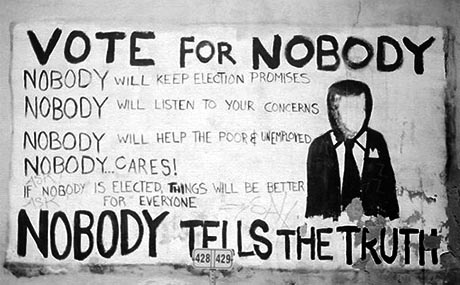Most educated and informed Americans will cast a vote for president by the end of the day Tuesday. I won’t be among them. I know quite a number of intelligent, informed and principled people who will also decline to vote. I’d like to explain my reasons — and I’d like to suggest that you consider joining us as non-voters.
For as long as you can remember, people have preached to you about your duty to vote. You’ve been told that a good citizen should vote. You’ve been told that it doesn’t matter who you vote for, as long as you vote. And you’ve been told that every vote counts. There are even elaborate emails that people spam each other with that tell all the alleged cases in which one vote could have changed history. (Never mind that the examples are a pack of lies. People who have agendas don’t need to worry about facts.)
The “majority rules” system is a civic religion, and voting is the ultimate act of worship. When you vote, you are showing your allegiance to the government, whether you intend to or not. The very fact that you participate legitimizes the system. Your participation says, “I believe this is a morally right way to decide who gets power.” After all, if you’re willing to vote for your candidate’s right to hold power, how can you be claim that the other candidate doesn’t have the right to hold power when he wins?
Some people claim that if you don’t vote, you have no right to complain about the government and what it does. That’s irrational and backwards. If you do participate, you logically lose your right to protest the outcome. Your very participation says you believe it’s right and proper to use majority rule to decide who gets to be “in charge.” Only by refusing to participate — and by declaring the system to be immoral and unjust — can you have the moral authority to say, “No. What you’re doing is wrong. And I’m not giving it my sanction.”
For me, the majoritarian system is immoral. But even if you don’t oppose it on moral grounds, what are you achieving by being part of it? Are you getting what you want? Or are you simply obeying what you’ve been taught? Even if you haven’t reached the point of opposing the entire system on moral grounds, let’s review three quick points.
First, your one vote pretty much can’t change anything. If you can do basic math, you know why. Even in a super close presidential election, there would be thousands or hundreds of thousands of votes separating the two candidates nationally. Even if we put it on a statewide level, your one vote isn’t going to throw a state from one candidate to another. It just doesn’t happen that way. If the vote is that close, it’s going to end up in the hands of lawyers and judges arguing over things that have very little to do with your one vote. (Can you say “Florida” and “hanging chads”?)
Second, when you vote, you become a partisan. You start viewing things through the lens of “your group” and you become increasingly dishonest as your emotions get involved. Then you start listening to more of the people on “your side” and you become entrenched. Even if you think you’re a completely reasonable and rational person, if you become a part of Team Red or Team Blue — even just to the extent of voting for one of them and hoping for victory for “your side” — you start seeing the world in a different way. You see your “team” as the good guys and the other “team” as the bad guys. You get caught up in the Red vs. Blue argument — and you lose sight of the real issues. (And if you’re voting for a Third Party candidate, it’s a different form of useless. It’s a protest vote, but it still suggests that the basic system has moral legitimacy.)
Third, since your vote can’t make a difference by itself, you’re voting for symbolic reasons. What message are you sending? You’re sending a message — to yourself, to the government and to people around you — that you grant moral legitimacy to this system. You send the message that it’s right and proper to expect Barack Obama or Mitt Romney to rescue us. You send the message that you accept majoritarianism as your civic religion.
Since your one vote can’t make any difference, why not try detaching yourself from the process for awhile? See what it feels like. Ask yourself if it would make any difference if you paid attention to things that actually matter in daily life instead of politics. You don’t have to tell anybody. You don’t have to announce to the world that you’re renouncing the majoritarian system. You don’t have to become a rebel. But just do it. See if the sun still comes up. See if it makes any difference to walk away from it.
When you get away from a Red vs. Blue mentality, you start to see that the solution can’t come from either of them. Even if you’re not sure where the solution might come from, you can at least quit wasting your time and energy on things that can’t work. And you can remove your moral consent from a system that is slowly destroying you.
I won’t be giving my moral consent to an immoral system on Tuesday. Will you?

 Giving up politics left me flat broke; it’s time to earn some money again
Giving up politics left me flat broke; it’s time to earn some money again Free tires for a stranger? We forget all the people doing good
Free tires for a stranger? We forget all the people doing good Her cat’s presence brings comfort to grandmother dying in hospital
Her cat’s presence brings comfort to grandmother dying in hospital